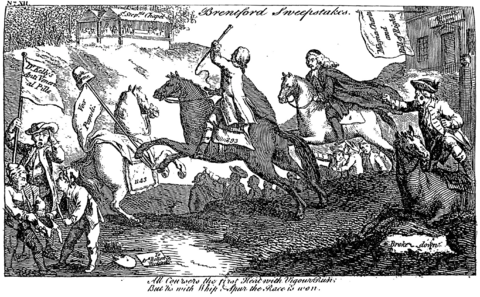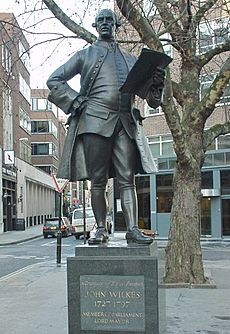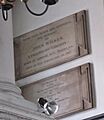John Wilkes facts for kids
Quick facts for kids
John Wilkes
|
|
|---|---|
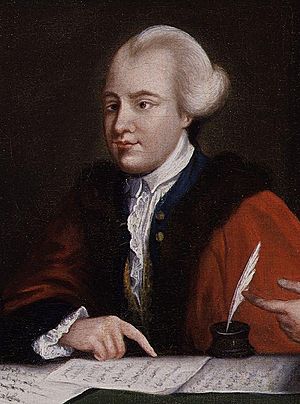
John Wilkes by Richard Houston (1769)
|
|
| Parliamentary offices | |
| 1757–1764 | Member of Parliament for Aylesbury |
| 1768–1769 | Member of Parliament for Middlesex |
| 1774–1790 | Member of Parliament for Middlesex |
| Civic offices | |
| 1754–1755 | High Sheriff of Buckinghamshire |
| 1771–1772 | Sheriff of London |
| 1774–1775 | Lord Mayor of London |
| Personal details | |
| Born |
John Wilkes
17 October 1725 Clerkenwell, London, Great Britain |
| Died | 26 December 1797 (aged 72) Westminster, London, Great Britain |
| Resting place | Grosvenor Chapel |
| Political party | Radical |
| Spouse |
Mary Meade
(m. 1747; sep. 1756) |
| Children | 3 |
| Relatives | Mary Hayley (sister) |
| Alma mater | Leiden University |
John Wilkes (17 October 1725 – 26 December 1797) was an English journalist and politician. He was known for fighting for people's rights and freedom of speech. He became a Member of Parliament in 1757.
Wilkes played a big role in making sure newspapers could print what was said in Parliament. He also tried to change how Parliament worked to make it fairer. During the American War of Independence, he supported the American colonists. Later in his life, his views changed, which made him less popular with some of his supporters.
Contents
Early Life and Education
John Wilkes was born in Clerkenwell, a part of central London. He was the third child of Israel and Sarah Wilkes. He had several brothers and sisters.
John went to school in Hertford and had private tutors. He also studied at the University of Leiden in the Netherlands. There, he met a clergyman named Andrew Baxter, who influenced his ideas about religion. Wilkes believed in religious tolerance, meaning people should be free to practice any religion.
In 1745, during a rebellion, Wilkes returned to London to help defend the city. After the rebellion ended, he went back to the Netherlands to finish his studies.
Family Life and Early Career
In 1747, John Wilkes married Mary Meade. They had one daughter, Mary, who he loved very much. However, John and Mary separated in 1756 and never got back together.
Wilkes became a member of the Royal Society in 1749. This is a famous group for scientists. In 1754, he was appointed High Sheriff of Buckinghamshire. He tried to become a Member of Parliament in 1754 but didn't win. However, he was elected for Aylesbury in 1757 and again in 1761.
He was also part of a group called the Hellfire Club. Wilkes was known for his clever jokes and quick responses. People said he wasn't handsome, but he was very charming. He once joked that he could "talk away his face" in half an hour, meaning his charm made people forget how he looked.
Fighting for Freedom
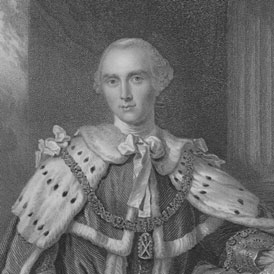
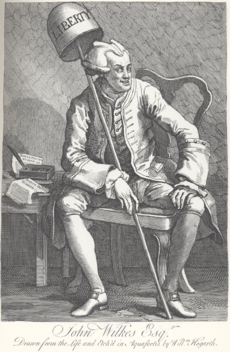
John Wilkes started his political career supporting William Pitt the Elder. He was very keen on Britain's involvement in the Seven Years' War. When John Stuart, 3rd Earl of Bute, became the head of the government in 1762, Wilkes started a newspaper called The North Briton. He used it to criticize Lord Bute, especially for what he saw as a bad peace deal to end the war.
The Famous Issue 45
On 23 April 1763, Wilkes strongly criticized a speech by King George III in issue 45 of The North Briton. The King felt personally insulted. He ordered the arrest of Wilkes and his publishers.
Forty-nine people were arrested. However, these "general warrants" (arrest warrants that didn't name specific people) were very unpopular. Wilkes argued that they were against the law. He gained a lot of public support. A judge ruled that Wilkes, as a Member of Parliament, was protected from arrest for libel. He was soon back in Parliament. People started chanting, "Wilkes, Liberty and Number 45!"
Parliament then quickly changed the law. They removed the protection for MPs from arrest for writing or publishing seditious libel.
Becoming an Outlaw
Wilkes's enemies in Parliament found a poem he had written that they called offensive. They used it to try and get him expelled from Parliament again. Wilkes fled to Paris before he could be expelled or put on trial. He was found guilty in his absence and declared an outlaw in 1764.
In 1768, Wilkes returned to England. He wanted to run for Parliament again. The government didn't arrest him right away because they didn't want to make him even more popular.
He was elected as a Member of Parliament for Middlesex, where he had a lot of support. He then gave himself up to the court. He was sentenced to two years in prison and fined £1,000.
The St George's Fields Incident
When Wilkes was in prison in May 1768, his supporters gathered outside. They chanted "No liberty, no King." Soldiers opened fire on the unarmed crowd, killing seven people and wounding fifteen. This event became known as the Massacre of St George's Fields.
The Middlesex Election Dispute
Parliament expelled Wilkes in February 1769. But his supporters in Middlesex re-elected him. Parliament expelled him again, and he was re-elected again. After his third re-election, Parliament declared his opponent, Henry Luttrell, the winner, even though Wilkes had more votes.
Wilkes became an Alderman of London in 1769. He used his supporters' group, the Society for the Supporters of the Bill of Rights, to help him. Eventually, Wilkes convinced Parliament to remove the rule that stopped him from being a Member of Parliament.
While in Parliament, he spoke out against the government's policies towards the American colonies. He also introduced one of the first bills for parliamentary reform, though it didn't pass. After being released from prison in 1770, Wilkes became a sheriff in London. In 1771, a law was passed that allowed newspapers to print what was said in Parliament, something Wilkes had strongly supported.
Later Life and Legacy
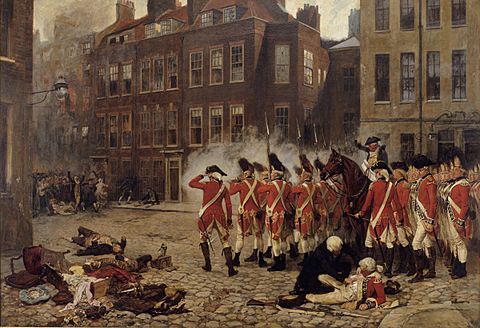
In 1774, John Wilkes became the Lord Mayor of London. He was also re-elected to Parliament, again representing Middlesex. He continued to oppose the war with the American colonies and supported religious tolerance. His biggest success was protecting the freedom of the press. He helped pass a law that removed the power of general warrants and stopped Parliament from punishing political reports of debates. In 1779, he became the Chamberlain of the City of London, a very important job he held until he died.
After 1780, his popularity began to decrease. During the Gordon Riots, a large uprising in London, Wilkes was in charge of the soldiers defending the Bank of England. He ordered the troops to fire into the crowds of rioters. This action made many working-class people, who had seen him as a hero, criticize him.
Wilkes was re-elected for Middlesex in 1784. However, by 1790, he had less support and withdrew from the election early. The French Revolution of 1789 caused a lot of division in England. Wilkes was against the violence in France, which was different from many other radicals at the time.
In his final years, Wilkes worked as a magistrate. He campaigned for more fair punishments for household servants. He died at his home in London on 26 December 1797, at the age of 72. He was buried in Grosvenor Chapel.
Influence and Legacy
John Wilkes was a hero to many people who wanted more rights in Britain and North America. The slogan "Wilkes and Liberty" was popular on both sides of the Atlantic.
His struggles in Britain made many American colonists believe that the British government was becoming unfair. This idea helped lead to the American Revolution. Wilkes was admired in the American colonies as a journalist and a fighter for freedom. He helped establish the right to freedom of the press in the United States. After the American Revolution, the new American constitution included rules to prevent Congress from rejecting any legally elected member and to ban general warrants for arrest.
Places Named After Wilkes
- Wilkes-Barre, Pennsylvania — named for John Wilkes and Isaac Barré.
- Wilkes University, a university in Wilkes-Barre, Pennsylvania.
- Wilkes Street in Spitalfields, London.
- Wilkes County, Georgia and Wilkes County, North Carolina.
- Wilkes Street in Alexandria, Virginia, U.S.
- The Wilkes Head (public house) in Eastergate, West Sussex.
- The Wilkes Head (public house) in Leek, North Staffordshire.
Images for kids
-
John Wilkes plaque in Grosvenor Chapel, London.
Offices and Titles
| Parliament of Great Britain (1707–1800) | ||
|---|---|---|
| Preceded by Thomas Potter |
Member of Parliament for Aylesbury 1757–1764 With: John Willes 1757–1761 Welbore Ellis 1761–1764 |
Succeeded by Welbore Ellis |
| Preceded by Sir William Beauchamp-Proctor, Bt |
Member of Parliament for Middlesex 1768–1769 With: George Cooke 1768 John Glynn 1768–1769 |
Succeeded by John Glynn |
| Preceded by John Glynn |
Member of Parliament for Middlesex 1774–1790 With: John Glynn 1774–1779 Thomas Wood 1779–1780 George Byng 1780–1784 William Mainwaring 1784–1790 |
Succeeded by William Mainwaring |
| Civic offices | ||
| Preceded by Charles Woodnoth, of Maid's Moreton |
High Sheriff of Buckinghamshire 1754–1755 |
Succeeded by Henry Uthwaite, of Lathbury |
| Preceded by William Baker |
Sheriff of London 1771–1772 |
Succeeded by Richard Oliver |
| Preceded by Frederick Bull |
Lord Mayor of London 1774–1775 |
Succeeded by John Sawbridge, MP |
See also
 In Spanish: John Wilkes para niños
In Spanish: John Wilkes para niños
 | Janet Taylor Pickett |
 | Synthia Saint James |
 | Howardena Pindell |
 | Faith Ringgold |


